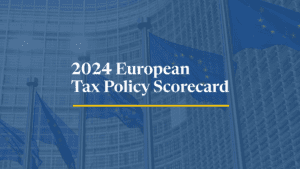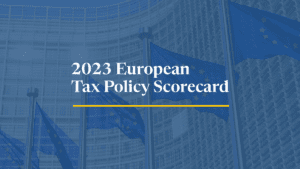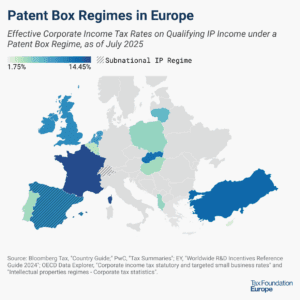
Tax Foundation Europe produces research and analysis specifically designed to inform five key debates in European tax policy: the concept of tax fairness, the twin transitions of the green and digital economies, government revenue and own resources, competitiveness and productivity, and the future of taxation in Europe.
One of our flagship tools is the European Tax Policy Scorecard (ETPS), which compares the competitiveness and neutrality of each country’s tax system, explains why certain tax codes stand out as better or worse models for reform, and measures the relative impact of EU tax policy on Member States. Explore the ETPS
Featured Issues
Global Tax Deal | European Tax Maps | Digital Taxes | Carbon Taxes | Cost Recovery
Featured Projects

European Tax Policy Scorecard
The ETPS compares the competitiveness and neutrality of each country’s tax system. A competitive tax code keeps marginal tax rates low and a neutral tax code raises the most revenue with the fewest economic distortions. Together, these principles promote sustainable growth while raising sufficient revenue.

Investment in the United Kingdom Increased following Pro-Investment Tax Reforms
The UK economy is experiencing an upsurge in business fixed investment following two pro-growth tax changes. In the second quarter of 2023, business investment was 9.4 percent higher than the same quarter last year.
10 min read
2023 Spanish Regional Tax Competitiveness Index
The 2023 Spanish Regional Tax Competitiveness Index allows policymakers and taxpayers to evaluate and measure how their regions’ tax systems compare.
6 min read
Testimony: The Role of Corporate Taxation in the European Union’s Future Tax Policy Mix
As policymakers shift their focus away from tax rates and look to harmonize the EU’s corporate tax base, they should understand the benefits of full expensing.

The Role of Pro-Growth Tax Policy and Private Investment in the European Union’s Green Transition
Permanent full expensing is an efficient and neutral tax policy that will allow markets to allocate private investment effectively while moving the economy towards the climate goals of the EU.
33 min read
Testimony: Capital Gains Taxation in the EU
It is essential to understand that the taxation of capital gains places a double tax on corporate income.
All European Research

A Distributed Profits Tax in Poland
The Polish government is considering converting its traditional corporate income tax into a tax on distributed profits. We estimate that this reform would result in greater investment, a larger productive capital stock, and higher economic output in the long run.
29 min read
Taxing Powerhouses: The Systematic Role of Businesses in Collecting Government Revenue
On average, businesses in the OECD are liable for collecting, paying, and remitting more than 85 percent of the total tax collection.
15 min read
2024 European Tax Policy Scorecard
The variety of approaches to taxation among European countries creates a need to evaluate these systems relative to each other. For that purpose, we have developed the European Tax Policy Scorecard—a relative comparison of European countries’ tax systems.
55 min read
2024 Spanish Regional Tax Competitiveness Index
The 2024 Spanish Regional Tax Competitiveness Index allows policymakers and taxpayers to evaluate and measure how their regions’ tax systems compare.
7 min read
Statutory vs. Effective Tax Rates: Why Do Higher Taxes Not Necessarily Lead to Increased Revenues?
The gap between statutory rates and average effective tax rates for personal income tax in the European Union varies significantly, affecting the efficiency and simplicity of the tax system.
32 min read
What European Countries Are Doing about Oil and Gas Windfall Profits Taxes
Rather than pursuing temporary policies, policymakers should implement long-term, pro-growth tax reforms that stimulate economic activity and incentivize energy diversification by supporting private investment through full expensing.
19 min read
The Impact of High Inflation on Tax Revenues across Europe
The European Union’s experience with high inflation highlights the critical need for adaptive fiscal policies. Best practices drawn from the academic literature recommend implementing automatic adjustment mechanisms with a certain periodicity and based on price increases.
31 min read
The High Cost of Wealth Taxes
Many developed countries have repealed their wealth taxes in recent years for a variety of reasons. They raise little revenue, create high administrative costs, and induce an outflow of wealthy individuals and their money. Many policymakers have also recognized that high taxes on capital and wealth damage economic growth.
30 min read
Overview and Analysis of the Impact of Marginal Taxes on High Incomes in the European Union
The recent push to increase taxes on the wealthy has gained significant traction across Europe. This report highlights the obstacles and complex interplay between tax policy and economic behavior, suggesting that simply raising tax rates on the wealthy might not yield the intended social benefits.
42 min read
Savings and Investment: The Tax Treatment of Stock and Retirement Accounts in the OECD and Select EU Countries
Tax-preferred private retirement accounts often have complex rules and limitations. Universal savings accounts could be a simpler alternative—or addition—to many countries’ current system of private retirement savings accounts.
19 min read
Investment in the United Kingdom Increased following Pro-Investment Tax Reforms
The UK economy is experiencing an upsurge in business fixed investment following two pro-growth tax changes. In the second quarter of 2023, business investment was 9.4 percent higher than the same quarter last year.
10 min read
2023 European Tax Policy Scorecard
The variety of approaches to taxation among European countries creates a need to evaluate these systems relative to each other. For that purpose, we have developed the European Tax Policy Scorecard—a relative comparison of European countries’ tax systems.
52 min read
2023 Spanish Regional Tax Competitiveness Index
The 2023 Spanish Regional Tax Competitiveness Index allows policymakers and taxpayers to evaluate and measure how their regions’ tax systems compare.
6 min read
The Role of Pro-Growth Tax Policy and Private Investment in the European Union’s Green Transition
Permanent full expensing is an efficient and neutral tax policy that will allow markets to allocate private investment effectively while moving the economy towards the climate goals of the EU.
33 min read
2022 Spanish Regional Tax Competitiveness Index
The 2022 Spanish Regional Tax Competitiveness Index allows policymakers and taxpayers to evaluate and measure how their regions’ tax systems compare.
8 min read
After the UK Super-Deduction: Assessing Proposals for the Reform of Capital Allowances
For many years, the UK has adopted a strikingly ungenerous approach to capital cost recovery – the ability of firms to write off investment against tax. This has coincided with consistently low levels of business investment. The super-deduction, which has temporarily made the UK tax system much more supportive of capital investment in plant and machinery is set to expire.
34 min read
Marginal Effective Tax Rates and the 2021 UK Budget
The 2021 UK budget introduces a two-year super-deduction of 130 percent for plant and equipment and a delayed corporate tax rate increase from 19 percent to 25 percent in 2023. These policies have differential impacts on marginal effective tax rates for different assets, implying investment incentives will not be uniform.
15 min read
The European Commission and the Taxation of the Digital Economy
The consultation on the EU’s digital levy provides an opportunity for policymakers and taxpayers to reflect on the underlying issues of digital taxation and potential consequences from a digital levy. Unless the EU digital levy is designed with an OECD agreement in mind, it is likely to cause more uncertainty in cross-border tax policy.
12 min read
A Framework for the Future: Reforming the UK Tax System
Our new guide identifies key areas for improvement in UK tax policy and provides recommendations that would support long-term growth without putting a dent in government revenues.
24 min read
Looking Back on 30 Years of Carbon Taxes in Sweden
Implemented in 1991, Sweden’s carbon tax was one of the first in the world. Since then, Sweden’s carbon emissions have been declining, while there has been steady economic growth. Today, Sweden levies the highest carbon tax rate in the world and its carbon tax revenues have been decreasing slightly over the last decade.
21 min read





